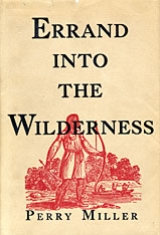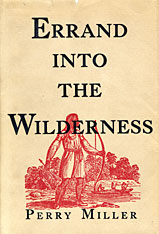
Perry Miller
Encyclopedia
Perry G. Miller was an American intellectual historian
and Harvard University
professor. He was an authority on American Puritan
ism, and a founder of the field of American Studies
. Alfred Kazin
referred to him as "the master of American intellectual history". In his most famous book, The New England Mind: The Seventeenth Century (1939), Miller adopted a cultural approach to illuminate the worldview of the Puritans, unlike previous historians who employed psychological and economic explanations of their beliefs and behavior.

and taught at Harvard beginning in 1931. In 1942 Miller resigned his post at Harvard to join the U.S. Army; he was stationed in Great Britain for the duration of the war, where he worked for the Office of Strategic Services
. Miller may have been instrumental in creating the Psychological Warfare Branch of the O.S.S.; certainly he worked for the PWB for the duration of the war. After 1945 Miller returned to teaching at Harvard.
Miller wrote book reviews and articles in The Nation
and American Scholar
. In his long-awaited biography of Jonathan Edwards, published in 1949, Miller argues that Edwards was actually an artist working in the only medium available to him in the 18th century American frontier, namely: that of religion and theology. His posthumously published The Life of the Mind in America, for which he received a Pulitzer Prize
, was only the first installment of a projected ten-volume series.
Miller spent a year at the Institute for Advanced Study
in Princeton, New Jersey
on a Guggenheim Fellowship
and also taught in Japan for a year. His death was a tragic loss to America's intellectual landscape. Felix Frankfurter
wrote a moving obituary for Miller which was published in The New York Herald Tribune after his death.
for the harder relativism later developed by Thomas Kuhn
. That is, for Miller 'forms' are neither wholly arbitrary nor entirely discovered in 'the facts,' but are instead the inheritance and creation of the historian, altered and confirmed by his experience.
Historian
A historian is a person who studies and writes about the past and is regarded as an authority on it. Historians are concerned with the continuous, methodical narrative and research of past events as relating to the human race; as well as the study of all history in time. If the individual is...
and Harvard University
Harvard University
Harvard University is a private Ivy League university located in Cambridge, Massachusetts, United States, established in 1636 by the Massachusetts legislature. Harvard is the oldest institution of higher learning in the United States and the first corporation chartered in the country...
professor. He was an authority on American Puritan
Puritan
The Puritans were a significant grouping of English Protestants in the 16th and 17th centuries. Puritanism in this sense was founded by some Marian exiles from the clergy shortly after the accession of Elizabeth I of England in 1558, as an activist movement within the Church of England...
ism, and a founder of the field of American Studies
American studies
American studies or American civilization is an interdisciplinary field dealing with the study of the United States. It traditionally incorporates the study of history, literature, and critical theory, but also includes fields as diverse as law, art, the media, film, religious studies, urban...
. Alfred Kazin
Alfred Kazin
Alfred Kazin was an American writer and literary critic, many of whose writings depicted the immigrant experience in early twentieth century America....
referred to him as "the master of American intellectual history". In his most famous book, The New England Mind: The Seventeenth Century (1939), Miller adopted a cultural approach to illuminate the worldview of the Puritans, unlike previous historians who employed psychological and economic explanations of their beliefs and behavior.

Biography
Miller was born in Chicago, Illinois. He earned his undergraduate and postgraduate degrees from the University of ChicagoUniversity of Chicago
The University of Chicago is a private research university in Chicago, Illinois, USA. It was founded by the American Baptist Education Society with a donation from oil magnate and philanthropist John D. Rockefeller and incorporated in 1890...
and taught at Harvard beginning in 1931. In 1942 Miller resigned his post at Harvard to join the U.S. Army; he was stationed in Great Britain for the duration of the war, where he worked for the Office of Strategic Services
Office of Strategic Services
The Office of Strategic Services was a United States intelligence agency formed during World War II. It was the wartime intelligence agency, and it was a predecessor of the Central Intelligence Agency...
. Miller may have been instrumental in creating the Psychological Warfare Branch of the O.S.S.; certainly he worked for the PWB for the duration of the war. After 1945 Miller returned to teaching at Harvard.
Miller wrote book reviews and articles in The Nation
The Nation
The Nation is the oldest continuously published weekly magazine in the United States. The periodical, devoted to politics and culture, is self-described as "the flagship of the left." Founded on July 6, 1865, It is published by The Nation Company, L.P., at 33 Irving Place, New York City.The Nation...
and American Scholar
The American Scholar (magazine)
The American Scholar is the literary quarterly of the Phi Beta Kappa Society, founded in 1932. The magazine has won fourteen National Magazine Awards from the American Society of Magazine Editors from 1999 to present, including awards for General Excellence...
. In his long-awaited biography of Jonathan Edwards, published in 1949, Miller argues that Edwards was actually an artist working in the only medium available to him in the 18th century American frontier, namely: that of religion and theology. His posthumously published The Life of the Mind in America, for which he received a Pulitzer Prize
Pulitzer Prize
The Pulitzer Prize is a U.S. award for achievements in newspaper and online journalism, literature and musical composition. It was established by American publisher Joseph Pulitzer and is administered by Columbia University in New York City...
, was only the first installment of a projected ten-volume series.
Miller spent a year at the Institute for Advanced Study
Institute for Advanced Study
The Institute for Advanced Study, located in Princeton, New Jersey, United States, is an independent postgraduate center for theoretical research and intellectual inquiry. It was founded in 1930 by Abraham Flexner...
in Princeton, New Jersey
Princeton, New Jersey
Princeton is a community located in Mercer County, New Jersey, United States. It is best known as the location of Princeton University, which has been sited in the community since 1756...
on a Guggenheim Fellowship
Guggenheim Fellowship
Guggenheim Fellowships are American grants that have been awarded annually since 1925 by the John Simon Guggenheim Memorial Foundation to those "who have demonstrated exceptional capacity for productive scholarship or exceptional creative ability in the arts." Each year, the foundation makes...
and also taught in Japan for a year. His death was a tragic loss to America's intellectual landscape. Felix Frankfurter
Felix Frankfurter
Felix Frankfurter was an Associate Justice of the United States Supreme Court.-Early life:Frankfurter was born into a Jewish family on November 15, 1882, in Vienna, Austria, then part of the Austro-Hungarian Empire in Europe. He was the third of six children of Leopold and Emma Frankfurter...
wrote a moving obituary for Miller which was published in The New York Herald Tribune after his death.
Historiography
Hollinger (1968) explores the philosophical basis of Miller's historiography, arguing that Miller's formulation of problems was controlled by tensions between 'conscious' and 'mechanical' and between 'understanding' and 'mystery.' For Miller, the mechanical world was devoid of morality and purpose, and was incompatible with conscious beauty and ethics. By contrast, within the 'conscious' realm the drive for knowledge about an intelligible universe controlled by laws vied with the opposite religious faith in an unknowable universe controlled by God. Miller's history was further deepened by his emphasis on development: he sees history as proceeding in a continuing series of interactions between traditional cultural forms and immediate environmental circumstances. For Miller, culture is never merely the product of the environment, but an active agent in the interaction. The search for 'historical knowledge' itself proceeds on the terms of this interaction. Miller rejected both positivism and the relativism of Carl BeckerCarl L. Becker
Carl Lotus Becker was an American historian.-Life:He was born in Waterloo, Iowa. He studied at the University of Wisconsin–Madison. Frederick Jackson Turner was his doctoral advisor there. Becker got his Ph.D. in 1907. He was John Wendell Anderson Professor of History in the Department of History...
for the harder relativism later developed by Thomas Kuhn
Thomas Kuhn
Thomas Samuel Kuhn was an American historian and philosopher of science whose controversial 1962 book The Structure of Scientific Revolutions was deeply influential in both academic and popular circles, introducing the term "paradigm shift," which has since become an English-language staple.Kuhn...
. That is, for Miller 'forms' are neither wholly arbitrary nor entirely discovered in 'the facts,' but are instead the inheritance and creation of the historian, altered and confirmed by his experience.
Influence
Miller's attempts to discover and to reveal the religious feelings and the religious ideas set a new standard for intellectual historiography. Historians report that Miller's work has been felt on several generations of historians, from Puritan studies to discussions of narrative theory.Legacy
- At Harvard, he directed numerous PhD dissertation; his most notable students were Bernard BailynBernard BailynBernard Bailyn is an American historian, author, and professor specializing in U.S. Colonial and Revolutionary-era History. He has been a professor at Harvard University since 1953. Bailyn has won the Pulitzer Prize for History twice . In 1998 the National Endowment for the Humanities selected...
and Edmund MorganEdmund MorganEdmund Sears Morgan , an eminent authority on early American history, is Emeritus Professor of History at Yale University, where he taught from 1955 to 1986.-Life:...
. - Margaret AtwoodMargaret AtwoodMargaret Eleanor Atwood, is a Canadian poet, novelist, literary critic, essayist, and environmental activist. She is among the most-honoured authors of fiction in recent history; she is a winner of the Arthur C...
dedicated her famous book The Handmaid's Tale to Perry Miller. He had been a mentor to her at Harvard.
Books
- 1933. Orthodoxy in Massachusetts, 1630-1650
- 1939. The New England Mind: The Seventeenth Century online edition
- 1949. Jonathan Edwards
- 1953. The New England Mind: From Colony to Province
- 1953. Roger Williams: His Contribution to the American Tradition
- 1956. Errand into the Wilderness
- 1956. The American Puritans (editor) online edition
- 1957. The American Transcendentalists, their Prose and Poetry
- 1957. The Raven and the Whale: Poe, Melville and the New York Literary Scene
- 1958. Consciousness in Concord: The Text of Thoreau’s Hitherto “Lost Journal”
- 1961. The Legal Mind in America: from Independence to the Civil War
- 1965. Life of the Mind in America: From the Revolution to the Civil War online edition

